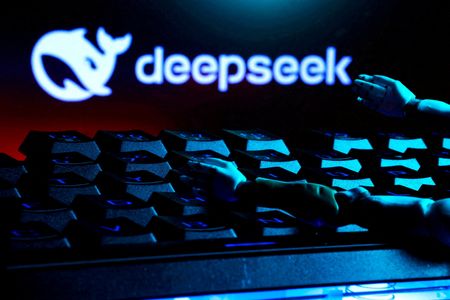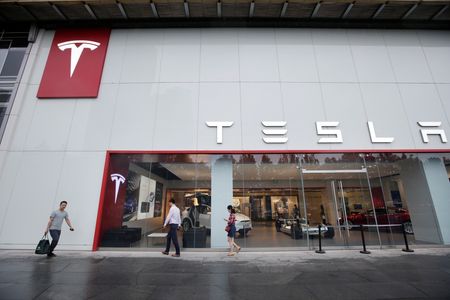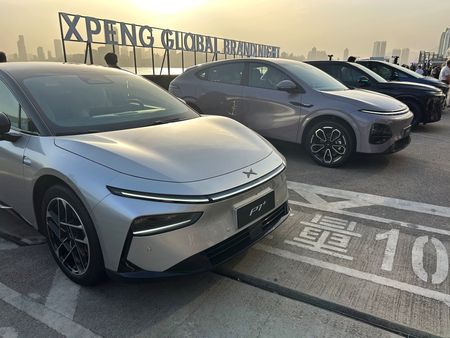By Samuel Shen and Jiaxing Li
SHANGHAI/HONGKONG (Reuters) -Chinese investors are rushing into AI-related stocks, betting the artificial intelligence advance of home-grown startup DeepSeek will lead to a boom in the sector and give the initiative to China in an intensifying Sino-U.S. technology war.
Feverish buying has pumped up shares of Chinese chipmakers, software designers and data centre operators amid patriotic calls for an upward repricing of Chinese assets as U.S. President Donald Trump recharges a trade war with fresh tariffs.
“DeepSeek’s breakthrough shows Chinese engineers are creative and capable of inventions that can compete with Silicon Valley,” said China Europe Capital Chairman Abraham Zhang. “It has also stirred nationalistic fever in capital markets.”
DeepSeek shocked Silicon Valley and rocked Wall Street late last month with the announcement of a competitive large language model that was ostensibly cheaper to develop than those of big-spending U.S. leaders such as OpenAI and Meta.
The event was described as a watershed moment by Huaxi Securities analysts and has since seen money gushing into AI-related stocks in mainland China and Hong Kong.
The Hang Seng AI Index has jumped more than 5% this week while indices tracking chipmakers and IT firms surged more than 11%, helping steady the Hong Kong market as the U.S. added a 10% tariff to Chinese imports.
On the mainland, investors returning from a week-long Lunar New Year holiday on Wednesday also piled into the tech sector, boosting shares of firms in AI, semiconductors, big data and robotics.
“2025 will witness an explosion of AI applications,” said Zhou Yingbo, head of investment at Futures Vessel Capital.
“We’re very optimistic about opportunities created by this revolution,” Zhou said, expecting widespread adoption of both AI hardware and software by consumers and businesses alike.
Likely beneficiaries include Nancal Technology, Suzhou MedicalSystem Technology, Doctorglasses Chain, Bestechnic Shanghai and Ucap Cloud Information Technology, Huaxi Securities said.
The DeepSeek development illustrates how the U.S. attempt to slow China’s technological advancement “has backfired, instead accelerating Chinese AI innovation,” TF Securities said in a client note. It called for a repricing of Chinese technology stocks which have underperformed U.S. peers in recent years amid increased regulatory scrutiny and geopolitical tension.
The emergence of DeepSeek could prompt even tighter U.S. technology export restrictions but that will only invite more government support and turbo-charge growth, the brokerage said.
Goldman Sachs expects Chinese breakthroughs in AI development and application “could materially alter” the stock market trajectory.
The Wall Street bank estimates AI-enabled efficiency improvement could increase earnings by 2% for Chinese equities, while brighter growth prospects could lead to a 20% valuation uplift for Chinese firms, narrowing the gap with U.S. peers.
China’s “hard tech” stocks trade at a price representing 23.6 times earnings, while “soft tech” shares trade at 13.9. The price-to-earnings ratio of the biggest U.S. tech stocks, the so-called “Mag 7”, is 31, showed the Goldman report dated Feb 4.
DeepSeek has created such a buzz that Chinese companies up and down the AI value chain, from chipmakers to cloud service providers are exploring possibilities with the startup’s low-cost services, including heavyweights such as Huawei Technologies, Alibaba and Baidu.
Yi Xiangjun, partner of Shenzhen Black Stone Asset Management, said he is “all in” China’s AI and tech stocks, betting large, successful companies will emerge in what he called an epoch-making revolution.
However, Wang Zhuo, partner of Shanghai Zhuozhu Investment Management, was more cautious.
“Many companies are still far way from generating profit from AI… As a value investor, I don’t feel confident putting money into these stocks.”
(Reporting by Samuel Shen and Jiaxing Li; Editing by Vidya Ranganathan and Christopher Cushing)










